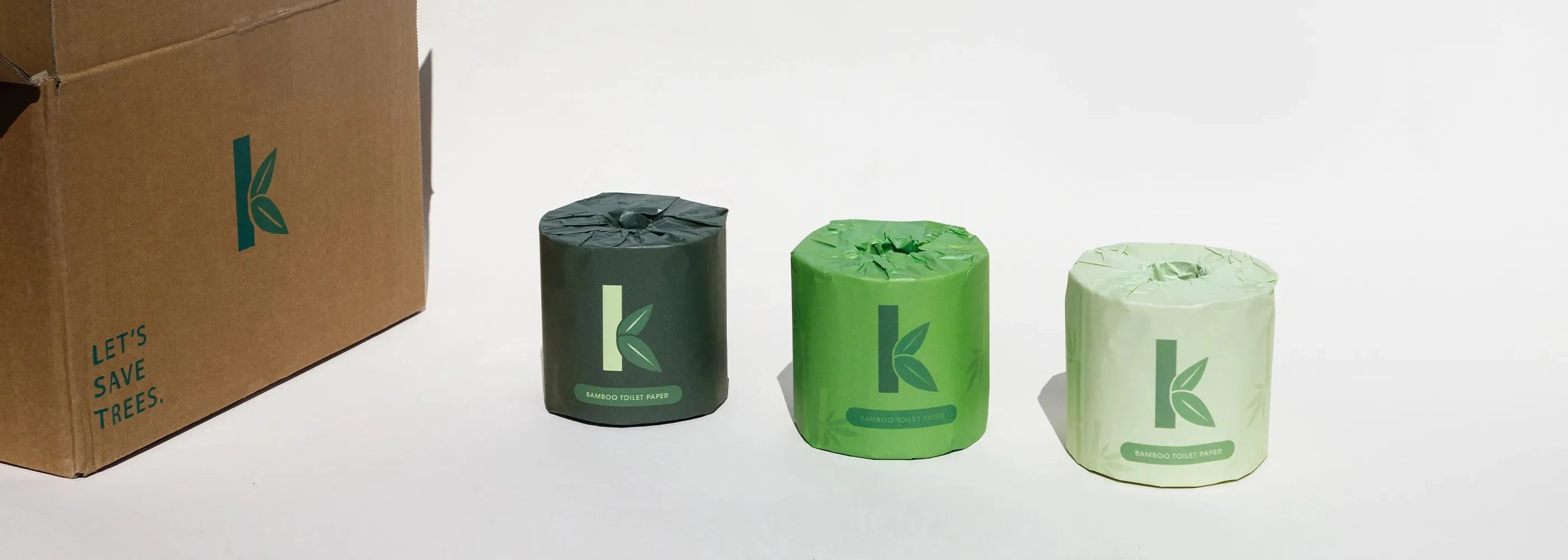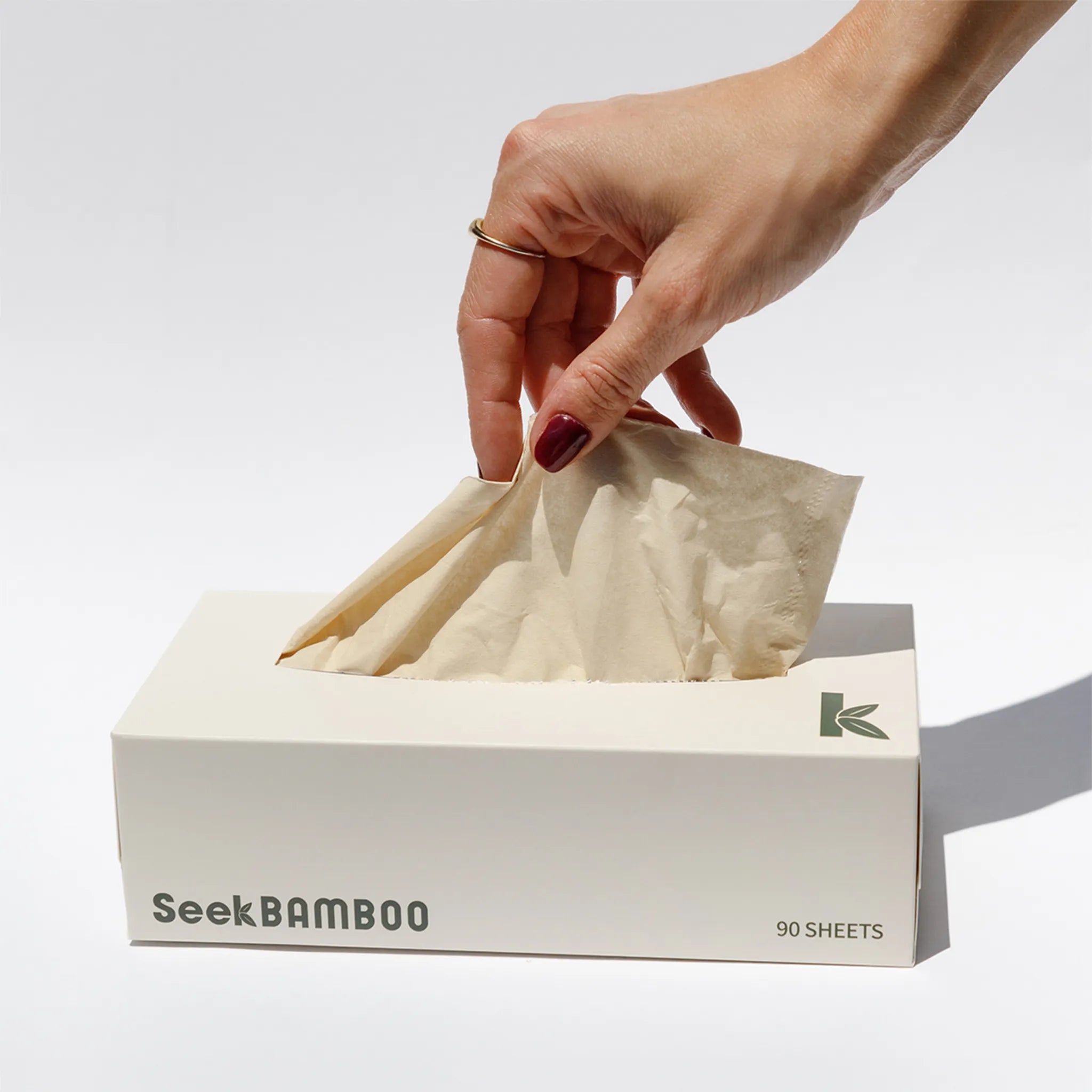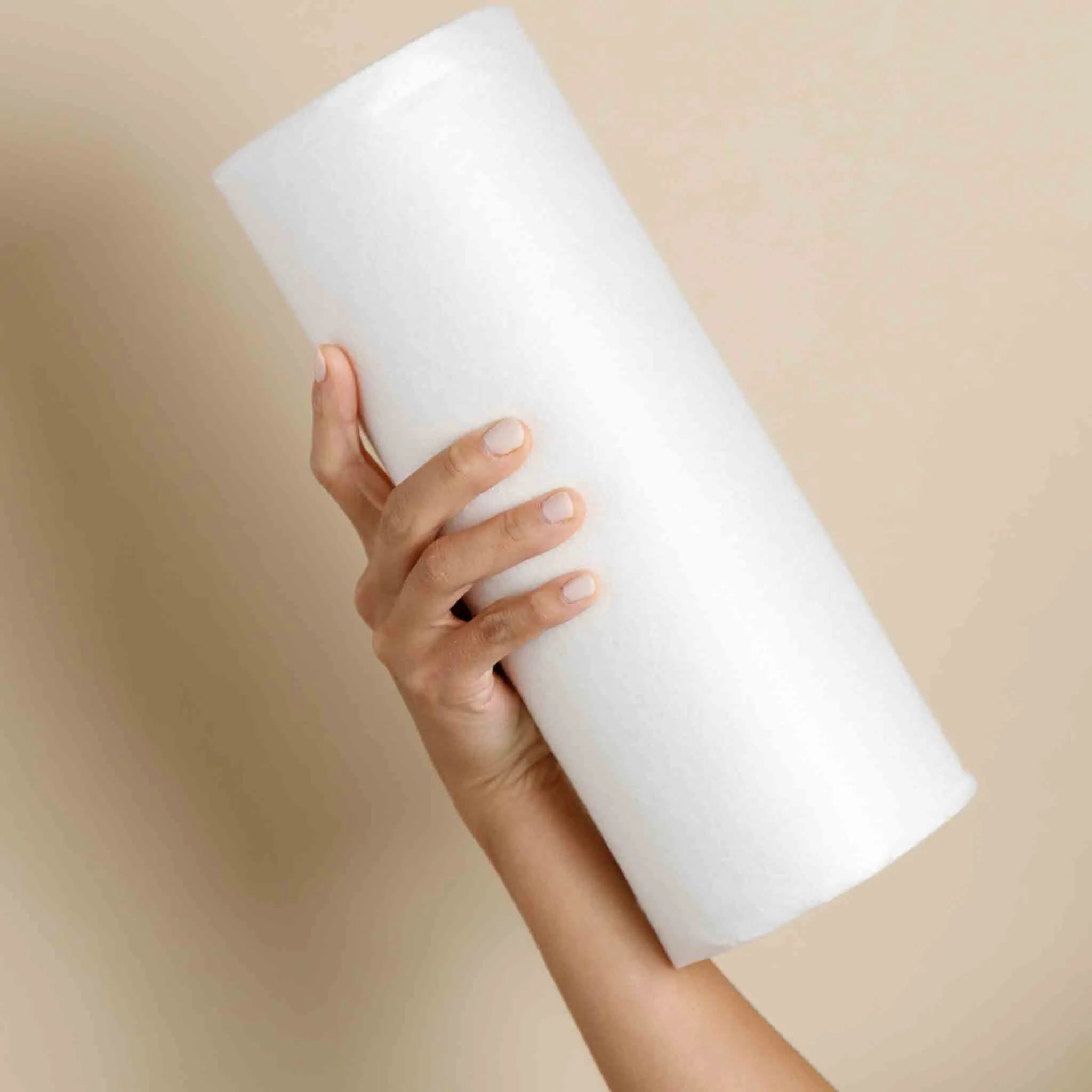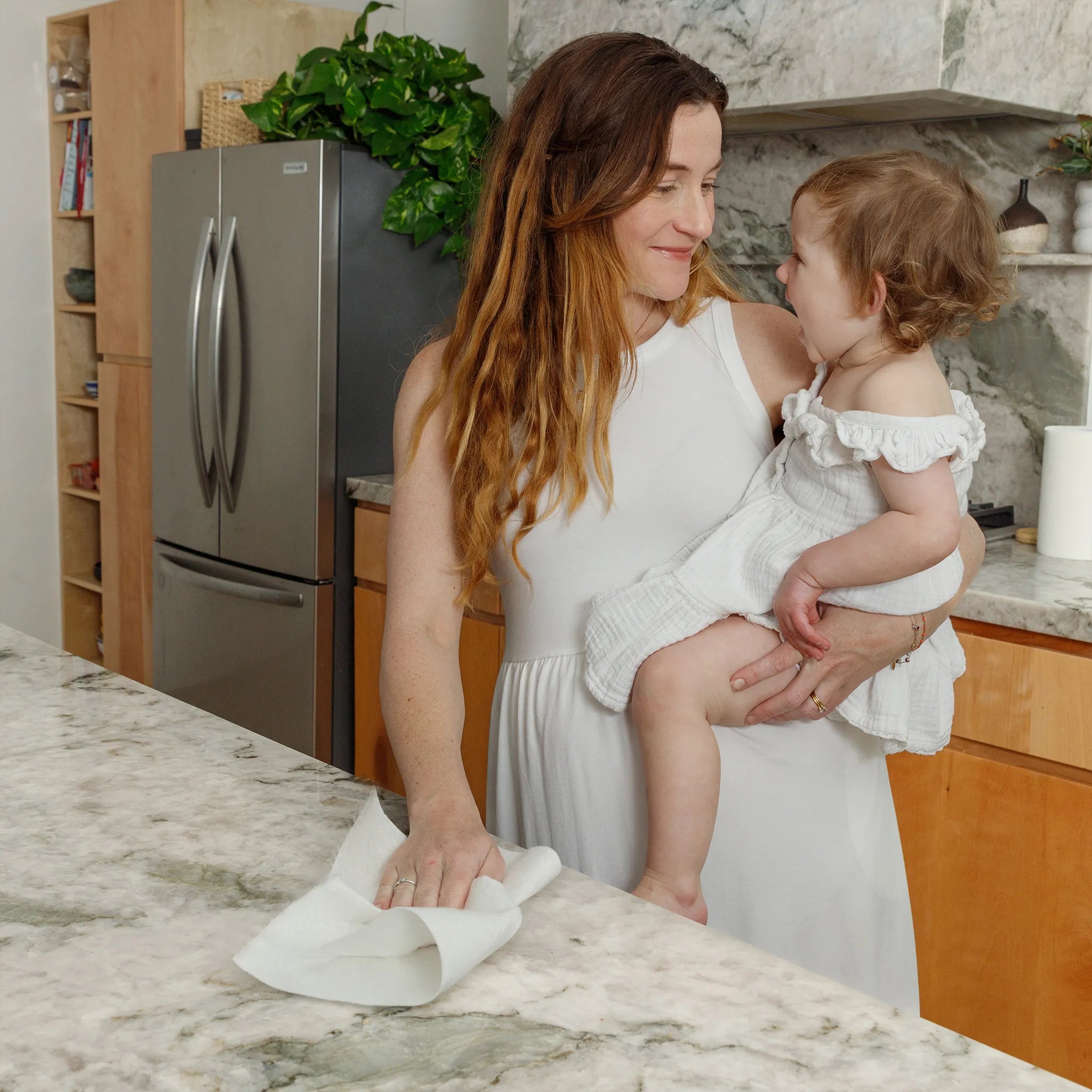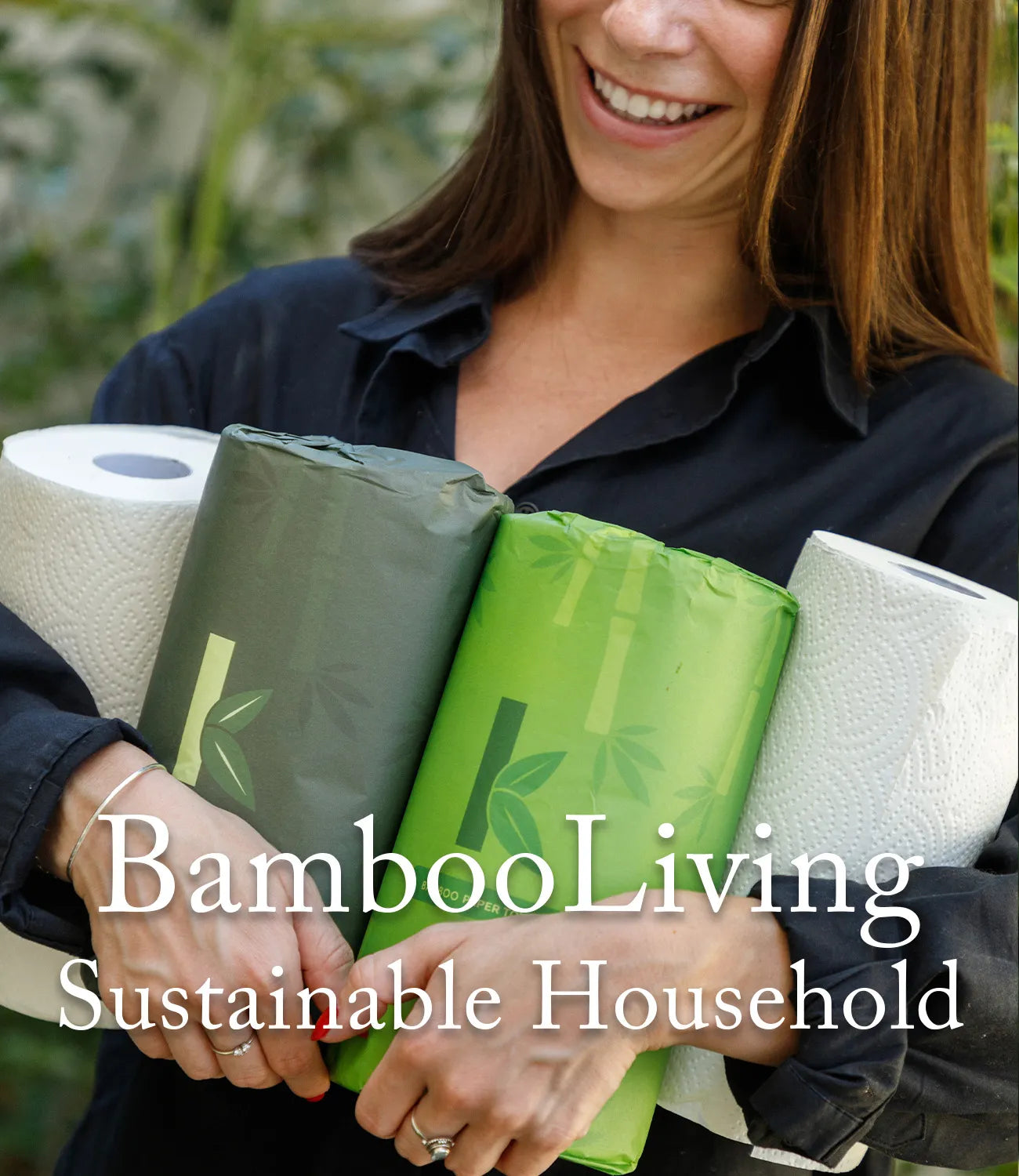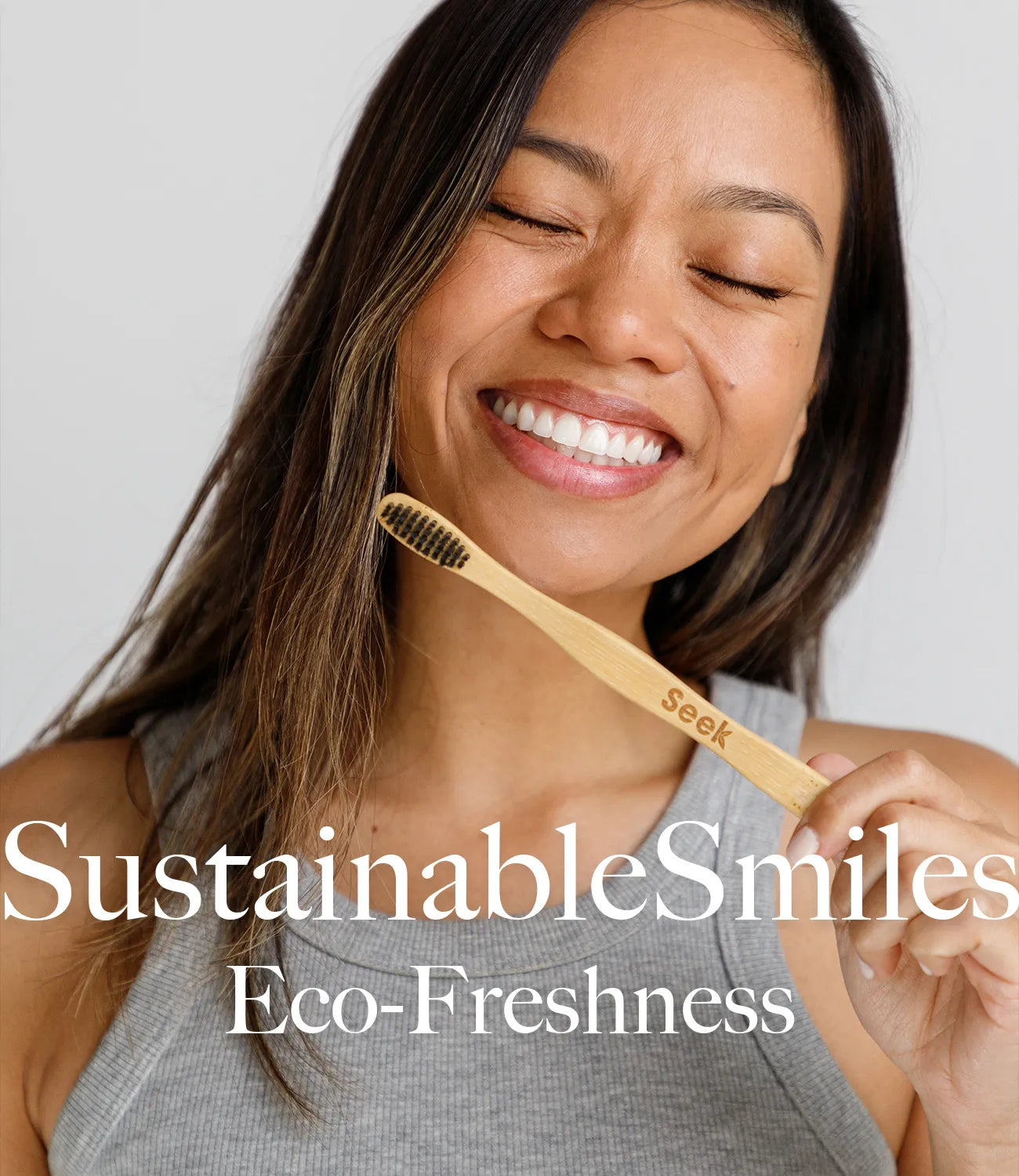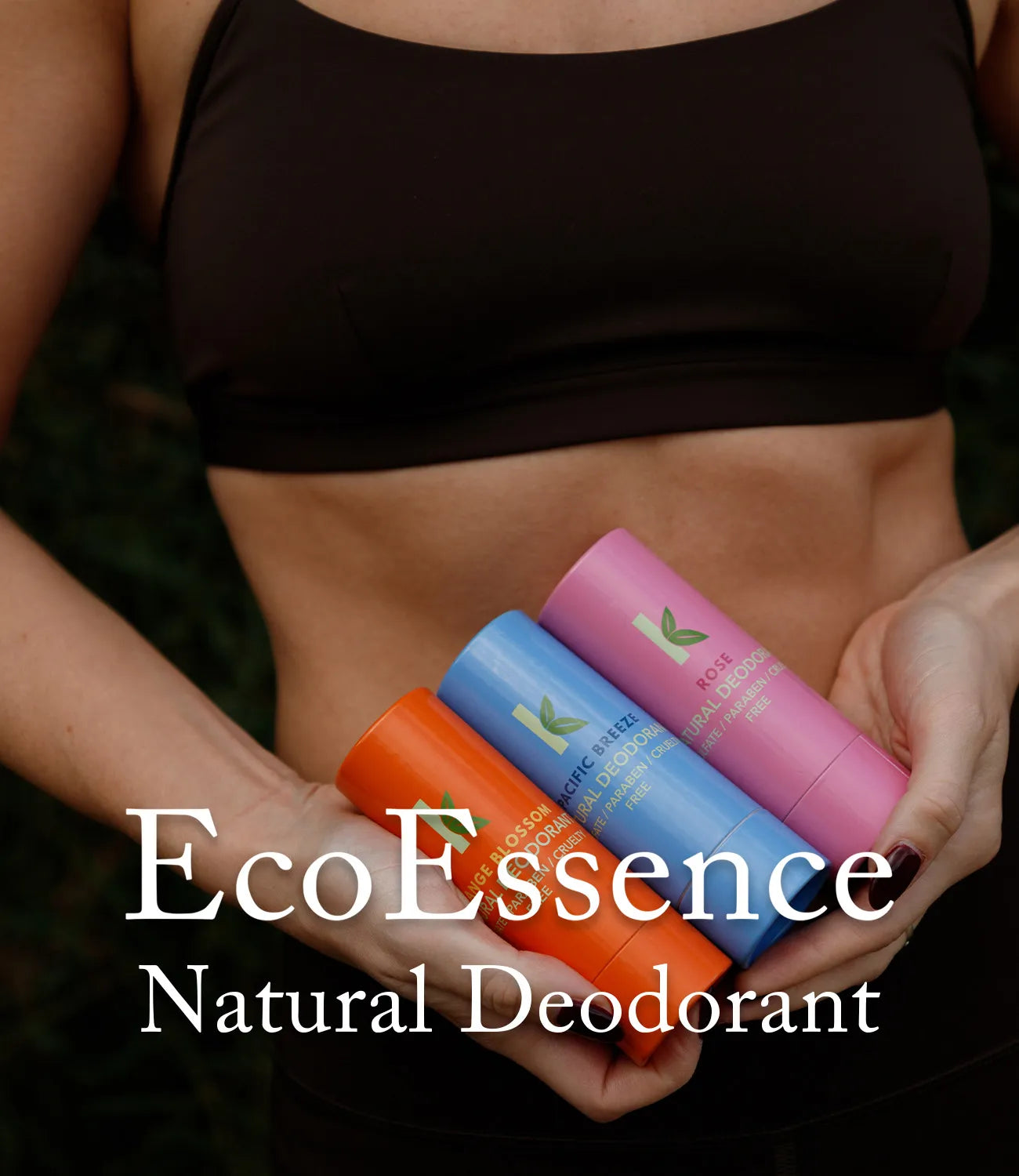Toilet Paper From Bamboo
In a world increasingly focused on sustainability, consumers are rethinking their everyday choices, including something as seemingly mundane as toilet paper. Enter bamboo toilet paper—a product that is rapidly gaining popularity among those looking to reduce their environmental impact without sacrificing quality or comfort. But what exactly is bamboo toilet paper, and why is it becoming a preferred choice over traditional options?
Bamboo toilet paper is an eco-friendly alternative made from the fibers of the bamboo plant, a remarkable grass that stands out for its rapid growth and renewability. Unlike the trees used in conventional toilet paper, which can take decades to mature, bamboo can reach full height in just a few short months and be harvested within three to five years. This quick turnaround makes bamboo an incredibly sustainable resource, capable of replenishing itself much faster than the trees traditionally used in paper production. Bamboo growth is fast and its versatility makes it an unmatched resource.
The environmental benefits of bamboo extend beyond its fast growth. Bamboo cultivation requires significantly less water than tree farming, and it thrives without the need for pesticides or chemical fertilizers, making it a more natural and less resource-intensive option. Furthermore, bamboo’s ability to grow in diverse climates and terrains means it can be cultivated in areas that are not suitable for other crops, contributing to land conservation and reducing the pressure on forests.
But the advantages of bamboo toilet paper aren't just about its environmental credentials. When it comes to performance, bamboo toilet paper is surprisingly soft and strong, often rivaling the comfort and durability of conventional brands. It’s also hypoallergenic, making it an excellent choice for people with sensitive skin, as it’s typically free from harsh chemicals and fragrances.
As more people become aware of the environmental impact of their choices, bamboo toilet paper offers a simple yet effective way to make a difference. By switching to bamboo, consumers can help reduce deforestation, lower their carbon footprint, and support more sustainable farming practices—all while enjoying a product that doesn’t compromise on quality. This shift in consumer preference is not just a trend but a reflection of a broader movement toward more conscious living, where even small choices, like the type of toilet paper we use, can have a significant impact on the planet.
The Sustainability of Bamboo
When we talk about sustainability, bamboo stands out as a champion among natural resources. Its cultivation and use in products like toilet paper offer significant environmental benefits, especially when compared to traditional tree-based paper production.
Bamboo is a grass that grows exceptionally fast—some species can grow up to three feet in a single day. This rapid growth rate means that bamboo can be harvested much more frequently than trees, which can take decades to mature. Because of this, bamboo is a highly renewable resource. After harvesting, bamboo plants do not need to be replanted; they regenerate from their roots, which helps to prevent soil erosion and maintain soil health. This is in stark contrast to tree farming, where entire forests can be cleared, leaving the land barren and vulnerable to degradation.
One of the most compelling sustainability benefits of bamboo is its low water usage. Bamboo requires significantly less water to grow than most tree species used in paper production. In an era where water scarcity is a growing concern, this makes bamboo an even more attractive option. Moreover, bamboo's deep root system helps retain moisture in the soil, reducing the need for irrigation and benefiting the surrounding ecosystem.
Another environmental advantage of bamboo is its minimal need for pesticides and fertilizers. Bamboo naturally resists pests and diseases, which means it can be grown without the heavy chemical inputs often required in tree farming. This not only makes bamboo cultivation more eco-friendly but also results in fewer chemicals entering the environment, which can harm wildlife and contaminate water supplies.
Bamboo also plays a significant role in carbon sequestration, the process of capturing and storing atmospheric carbon dioxide. Bamboo forests absorb more CO2 per hectare than many tree species, helping to mitigate climate change by reducing greenhouse gases in the atmosphere. A study by the International Network for Bamboo and Rattan (INBAR) found that bamboo can absorb up to 12 tons of CO2 per hectare per year, making it a powerful tool in the fight against global warming.
Comparing Bamboo to Traditional Toilet Paper
When comparing bamboo toilet paper to its traditional counterpart made from trees, the environmental benefits become even more apparent. The production of conventional toilet paper is a major contributor to deforestation, with millions of trees being cut down each year to meet global demand. This deforestation not only destroys habitats but also releases large amounts of stored carbon into the atmosphere, exacerbating climate change.
In contrast, bamboo toilet paper production requires far fewer resources. Because bamboo grows so quickly and regenerates naturally, there is no need for the large-scale deforestation that accompanies tree-based paper production. The reduced need for water and chemical inputs further minimizes its environmental footprint.
Moreover, the carbon sequestration potential of bamboo means that, overall, bamboo toilet paper can have a net positive effect on the environment. A Life Cycle Assessment (LCA) conducted on bamboo toilet paper versus traditional paper showed that bamboo products had a significantly lower impact on global warming potential, mainly due to the reduced emissions from deforestation and the high carbon capture rate of bamboo plants.
By choosing bamboo toilet paper, consumers can significantly reduce their carbon footprint and contribute to a more sustainable future. It’s a small change with a big impact—proof that even everyday products can play a part in preserving our planet.
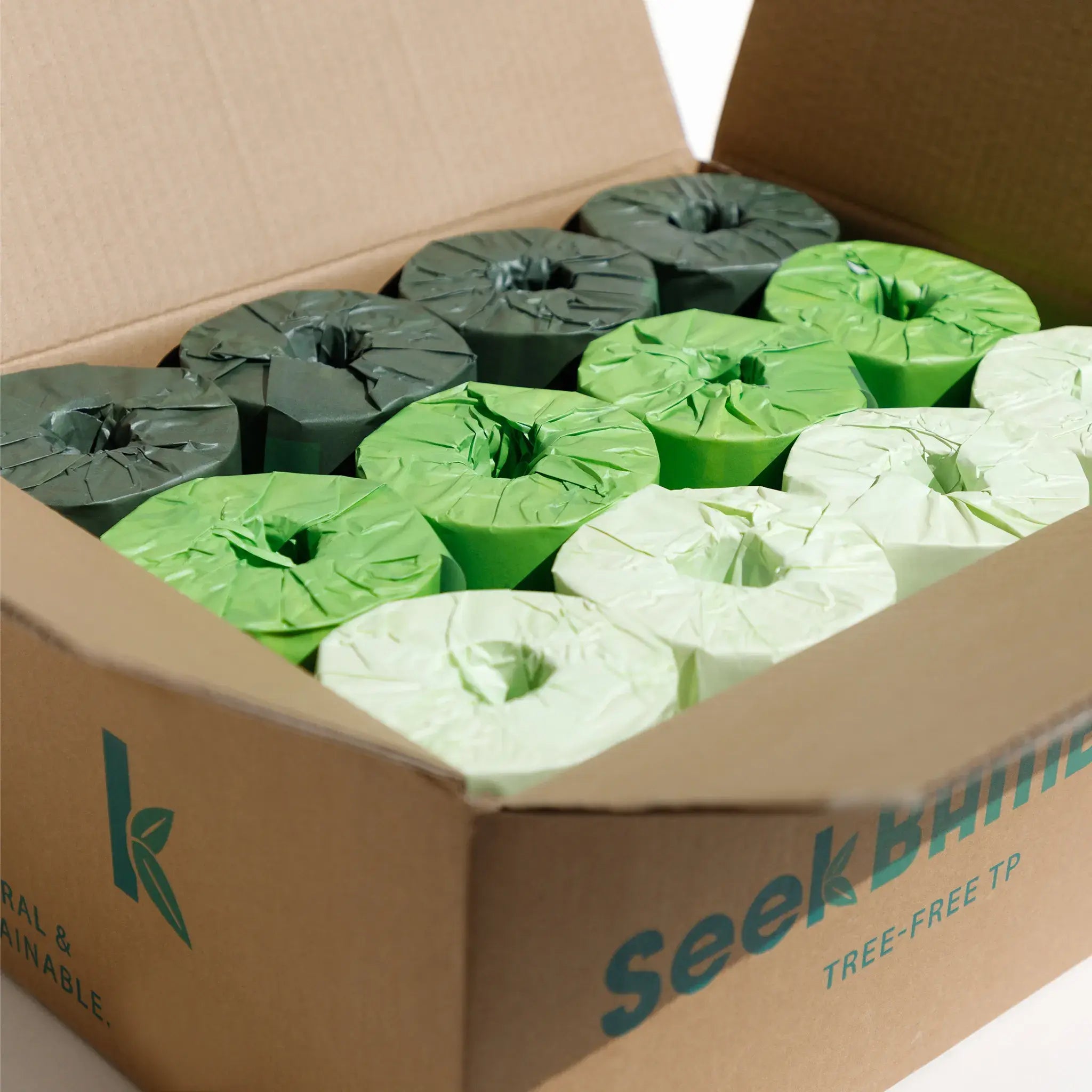
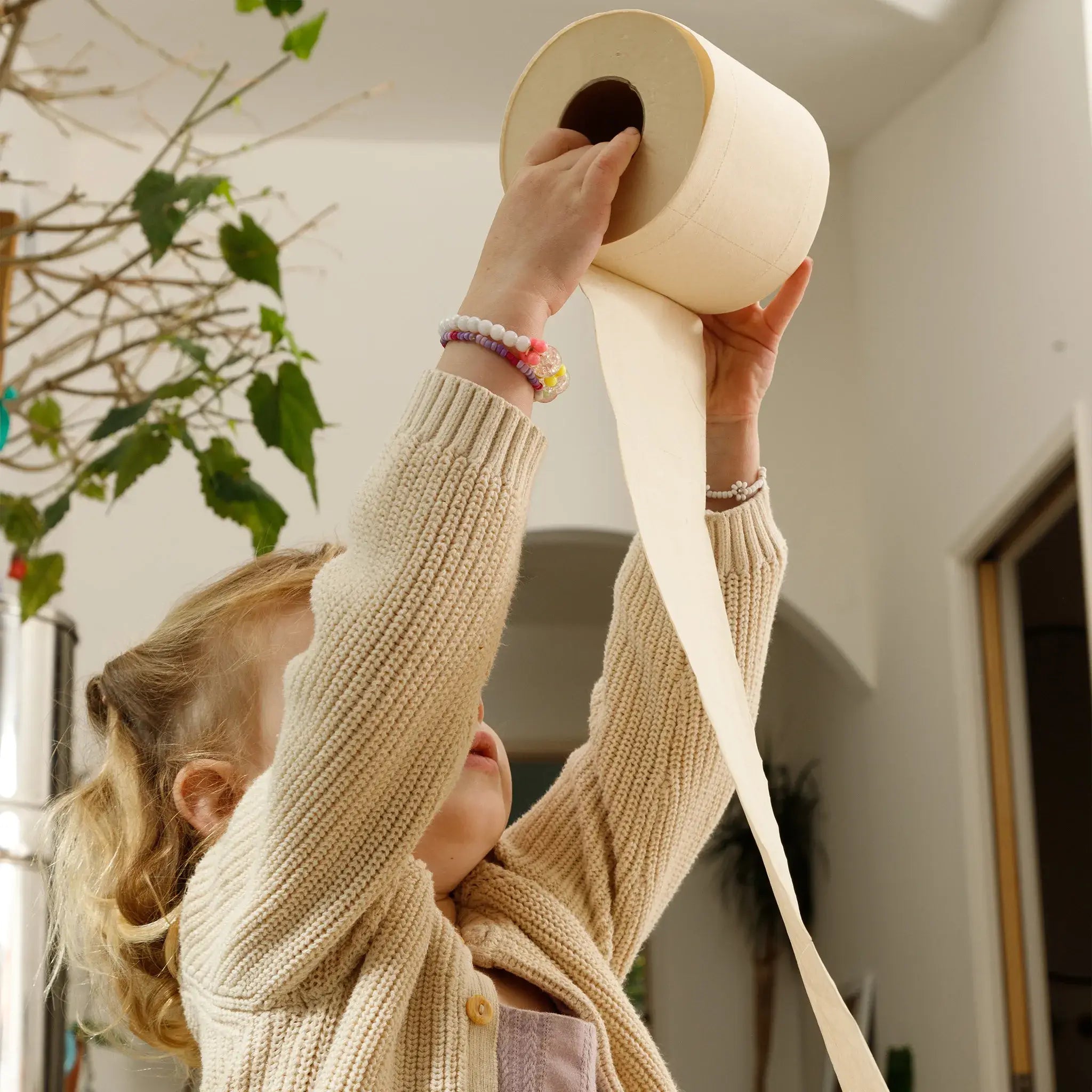
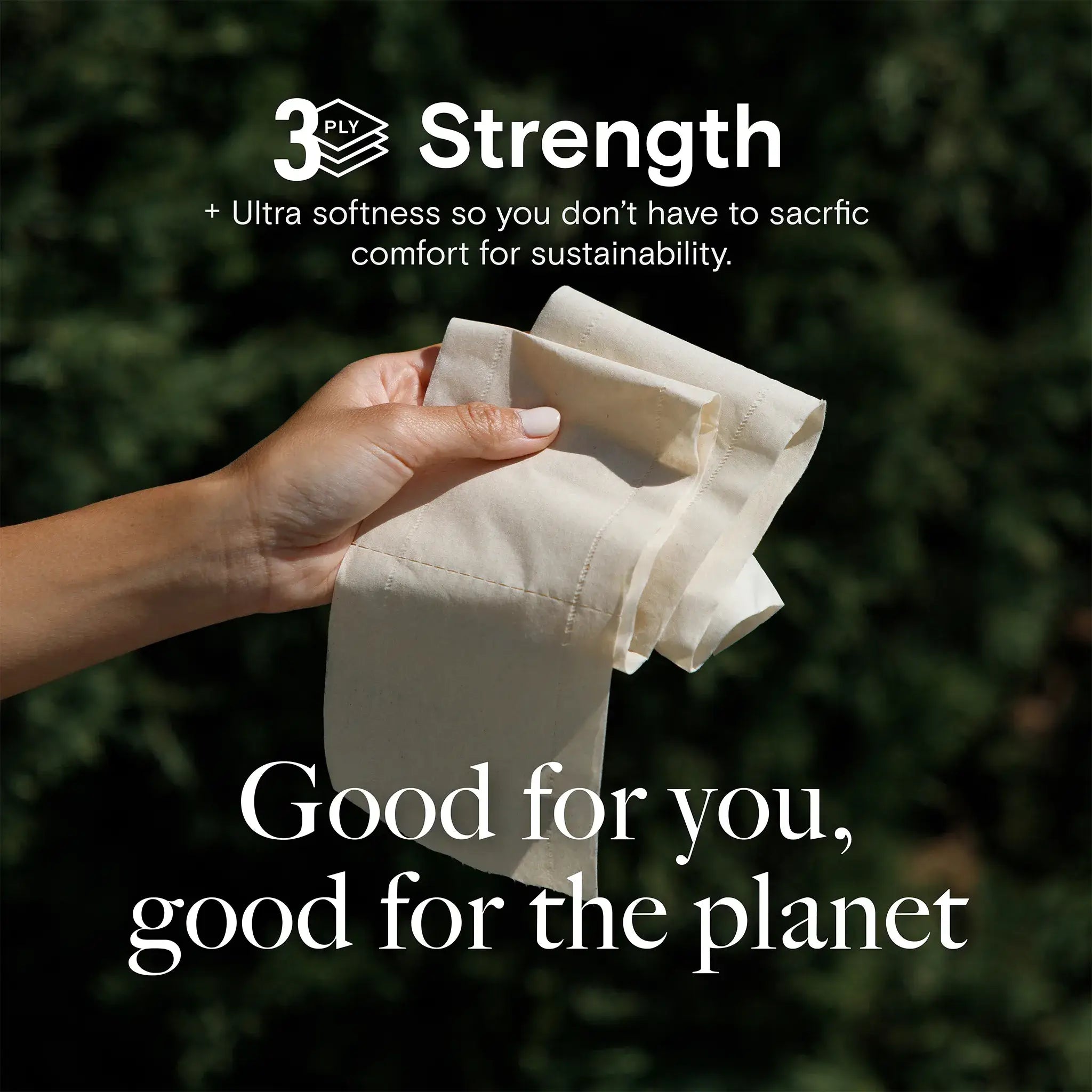
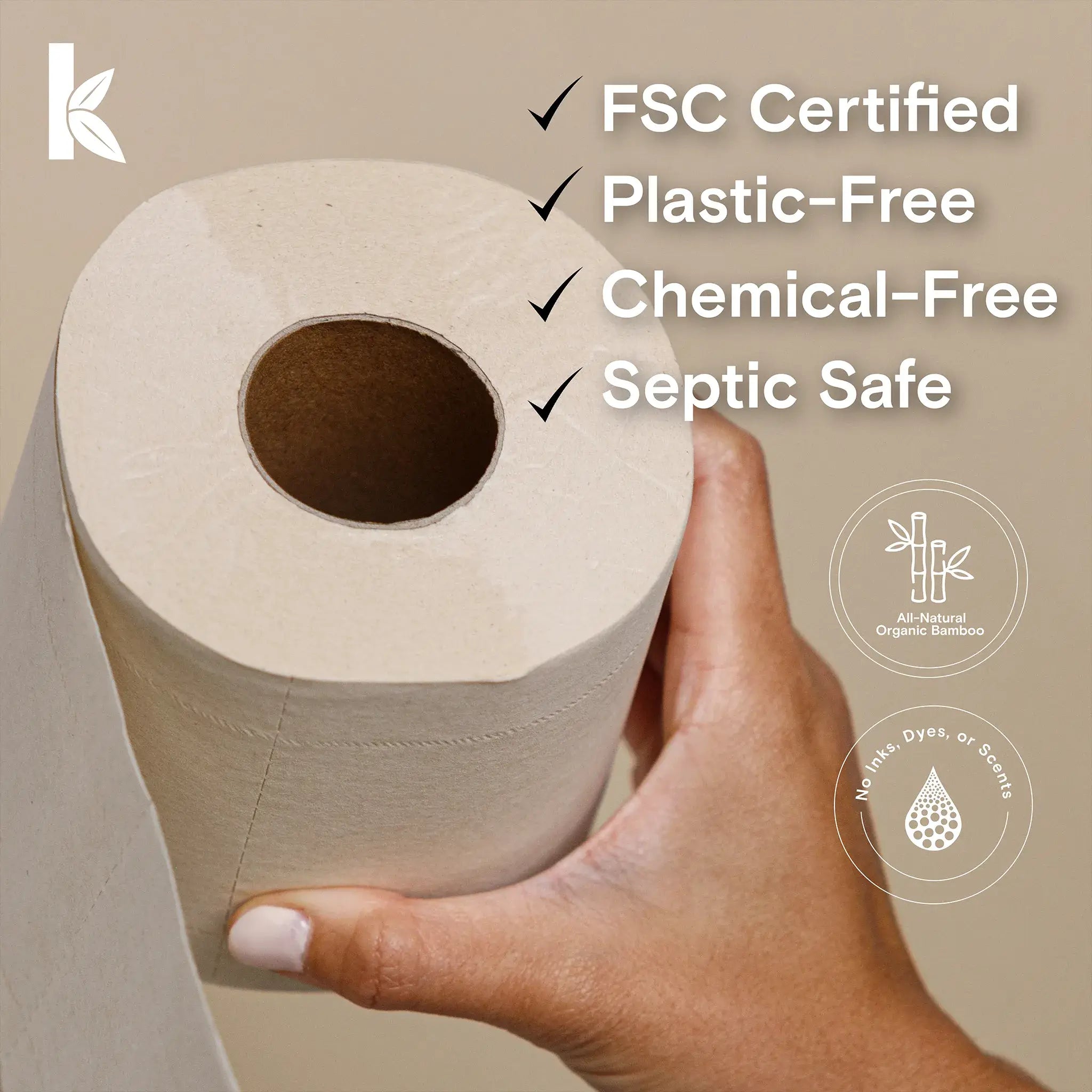
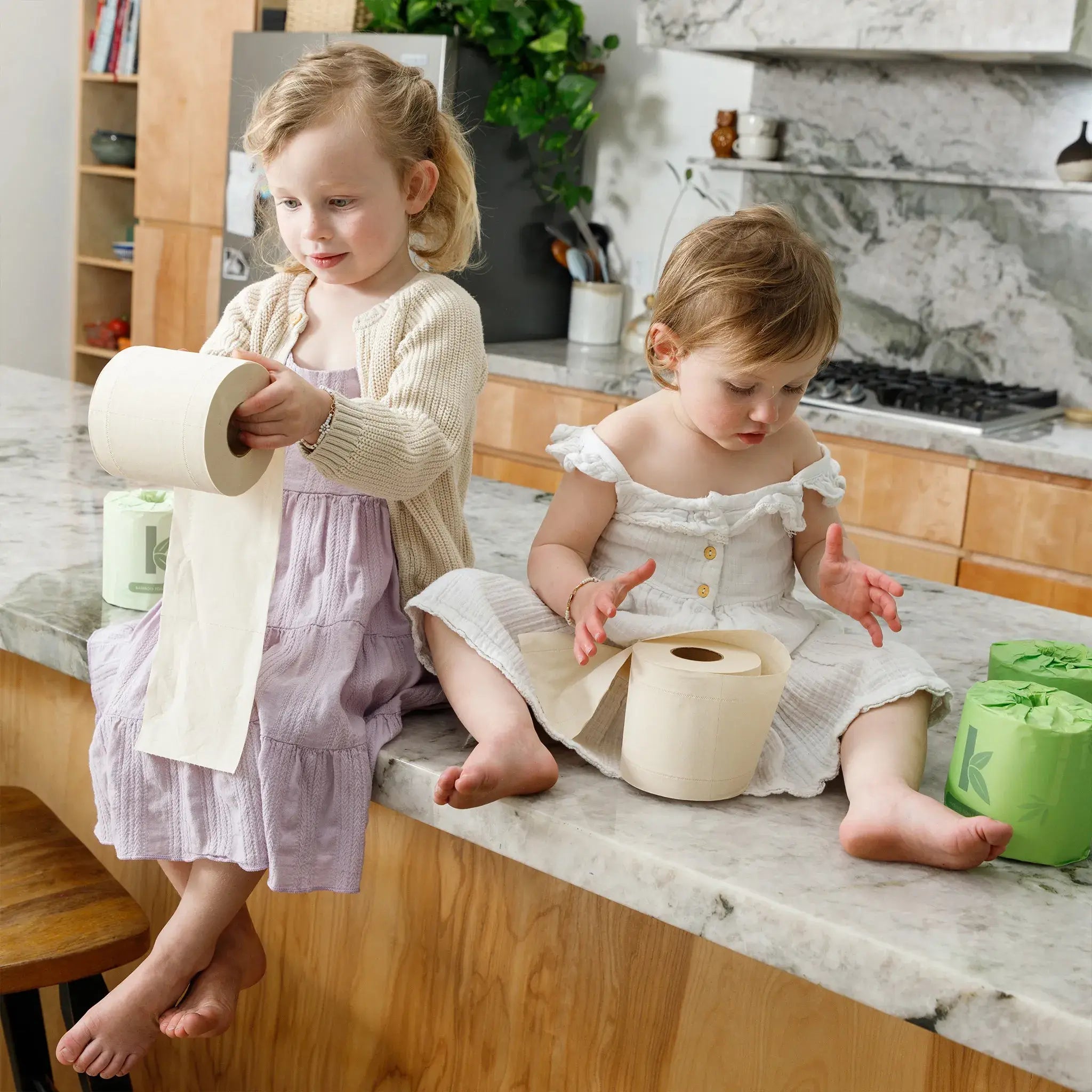

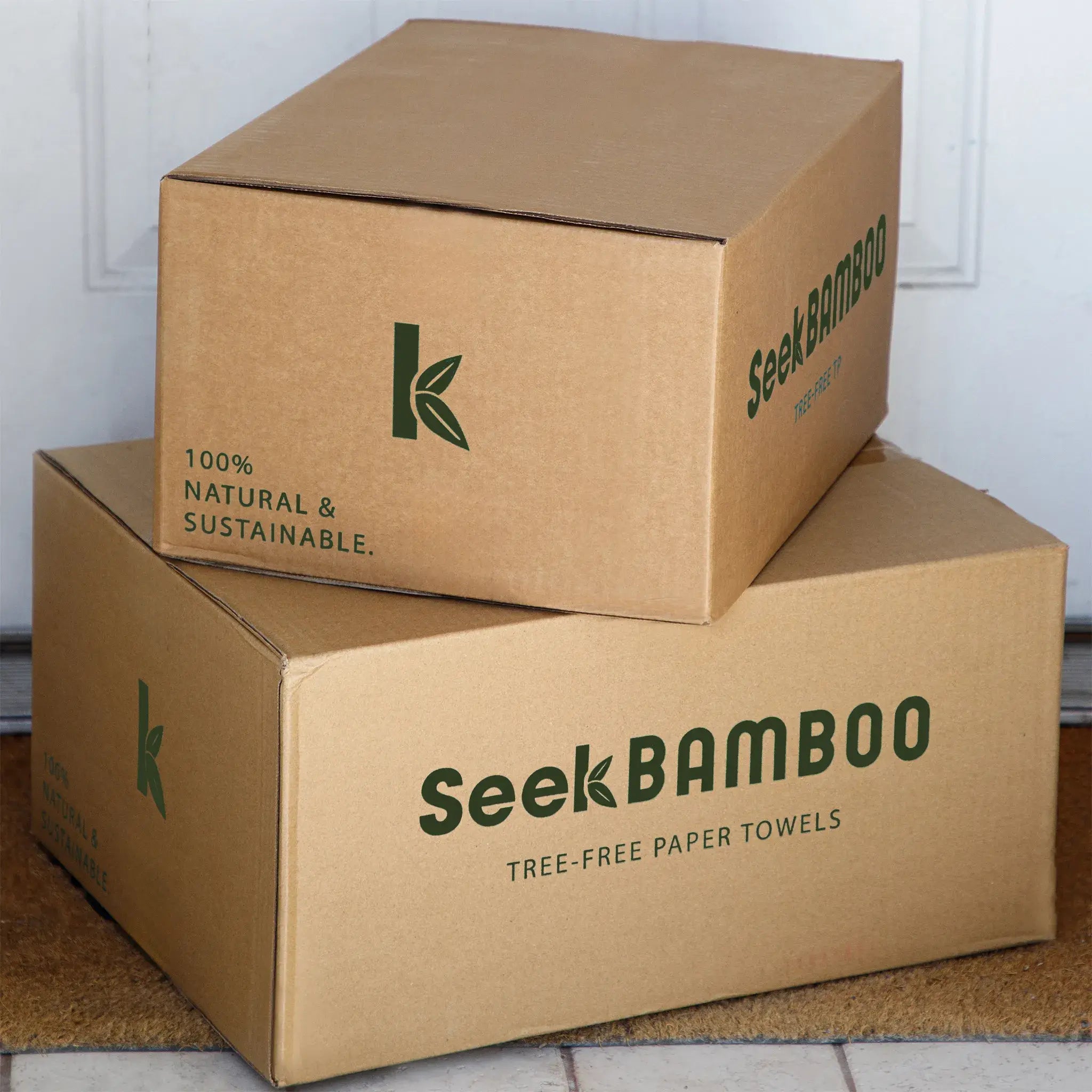
✓ Free of BPA, PFAS, chlorine, dyes, & fragrances
✓ Luxuriously layered 3-ply, 300 sheets per roll
✓ Naturally antibacterial, anti-fungal, & hypo-allergenic
✓ Hassle-free subscription, cancel or pause anytime
Benefits of Bamboo Toilet Paper
Switching to bamboo toilet paper isn’t just an environmentally conscious decision; it’s also a smart choice for those who value quality, comfort, and health. Bamboo toilet paper offers several benefits that make it an excellent alternative to traditional options, proving that eco-friendly doesn’t mean compromising on performance.
Softness and Strength
One of the most common misconceptions about eco-friendly products is that they are somehow less effective or less comfortable than their conventional counterparts. Bamboo toilet paper challenges this notion head-on, offering a product that is both incredibly soft and surprisingly strong.
Bamboo fibers are naturally smooth and rounded, which translates into a plush, luxurious feel when turned into toilet paper. This softness doesn’t come at the expense of strength, either. Bamboo is one of the strongest natural materials, and when processed into toilet paper, it retains a durability that ensures it won’t tear or disintegrate easily during use. This combination of softness and strength makes bamboo toilet paper a premium product that can hold its own against even the most well-known traditional brands.
For those concerned that choosing an eco-friendly option might mean sacrificing comfort, bamboo toilet paper is a pleasant surprise. It offers all the softness and reliability one would expect from a high-quality toilet paper, making it an easy switch for those looking to make their household products more sustainable.
Hypoallergenic and Chemical-Free
Another significant benefit of bamboo toilet paper is its hypoallergenic properties. Because bamboo is naturally resistant to pests and fungi, there’s no need for the heavy use of pesticides or chemical fertilizers during its cultivation. This means that the final product is typically free from harsh chemicals, such as chlorine bleach, dyes, and fragrances, which are often found in traditional toilet paper.
For people with sensitive skin, allergies, or conditions like eczema, bamboo toilet paper is a much gentler option. The absence of these irritating chemicals reduces the risk of skin irritation, making it a safer choice for everyone in the household, including babies and those with delicate skin.
Moreover, the chemical-free processing of bamboo toilet paper aligns with a broader movement toward natural and non-toxic household products. By choosing bamboo, you’re not only protecting your skin but also reducing the number of harmful substances entering your home and the environment.
Biodegradable and Compostable
In addition to being kind to your skin, bamboo toilet paper is also kind to the planet in its disposal. One of the standout features of bamboo toilet paper is its biodegradability. Unlike some conventional toilet papers, which can contain synthetic fibers or harsh chemicals that slow down decomposition, bamboo toilet paper is fully biodegradable. This means it breaks down more easily in landfills, reducing its environmental impact.
Even better, bamboo toilet paper can be composted under the right conditions. If you have a composting system, you can add bamboo toilet paper to your compost pile, where it will break down along with other organic matter. This not only reduces waste but also contributes to the creation of nutrient-rich compost that can be used in your garden.
The quick breakdown of bamboo toilet paper in both landfills and composting environments ensures that it doesn’t contribute to the long-term buildup of waste. In an age where we’re increasingly aware of the strain our waste puts on the planet, choosing products like bamboo toilet paper that are designed to decompose quickly and naturally is a simple yet effective way to reduce your environmental footprint.
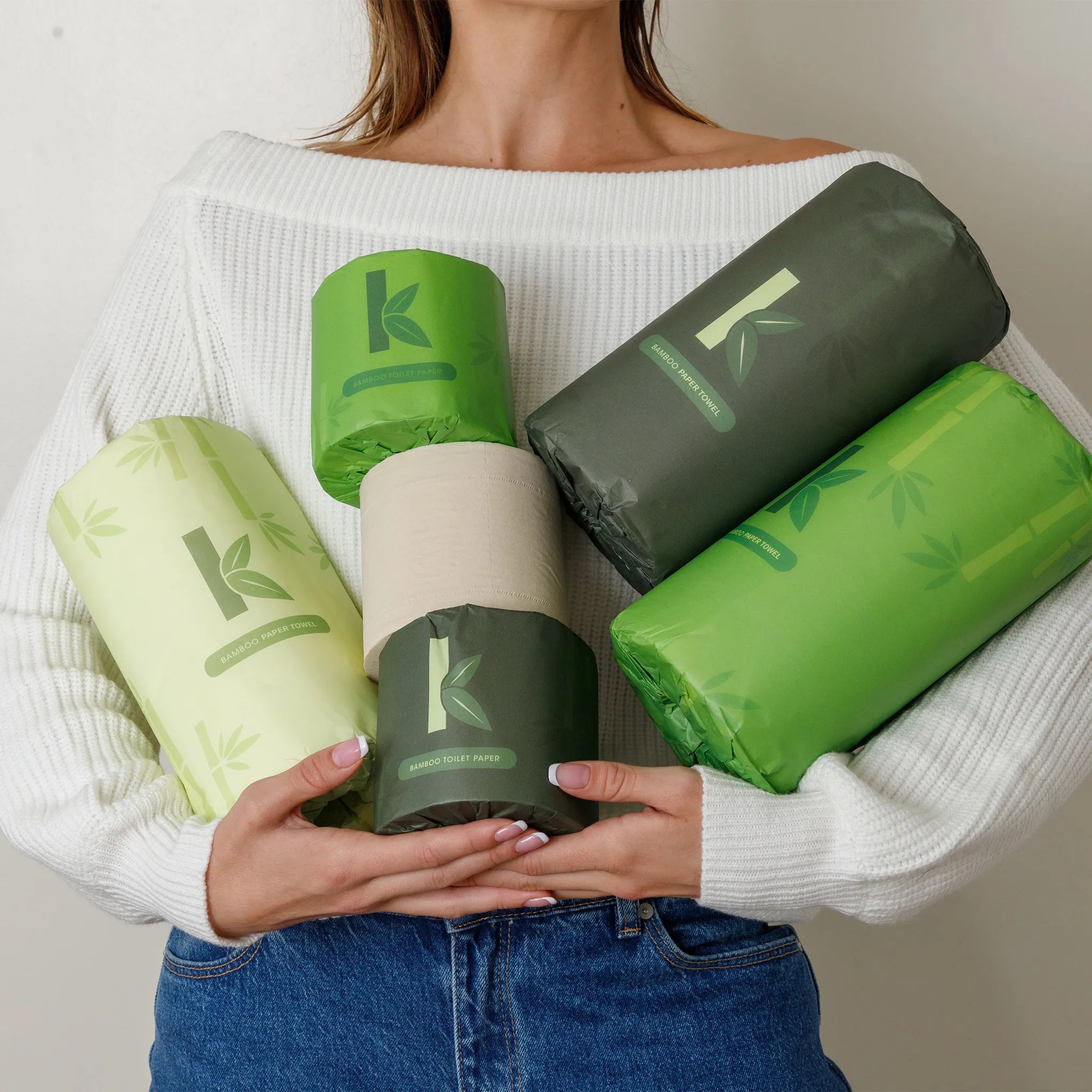
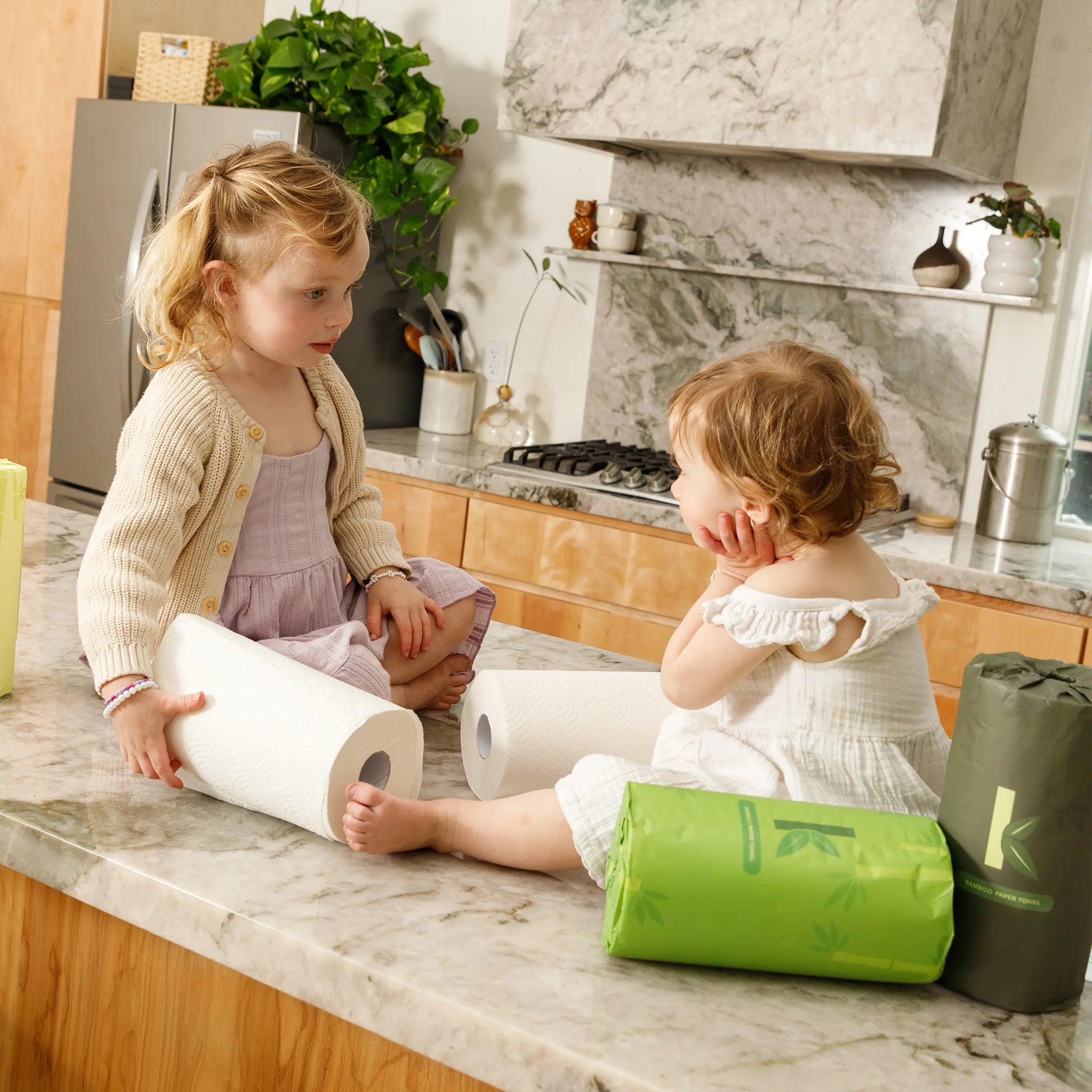
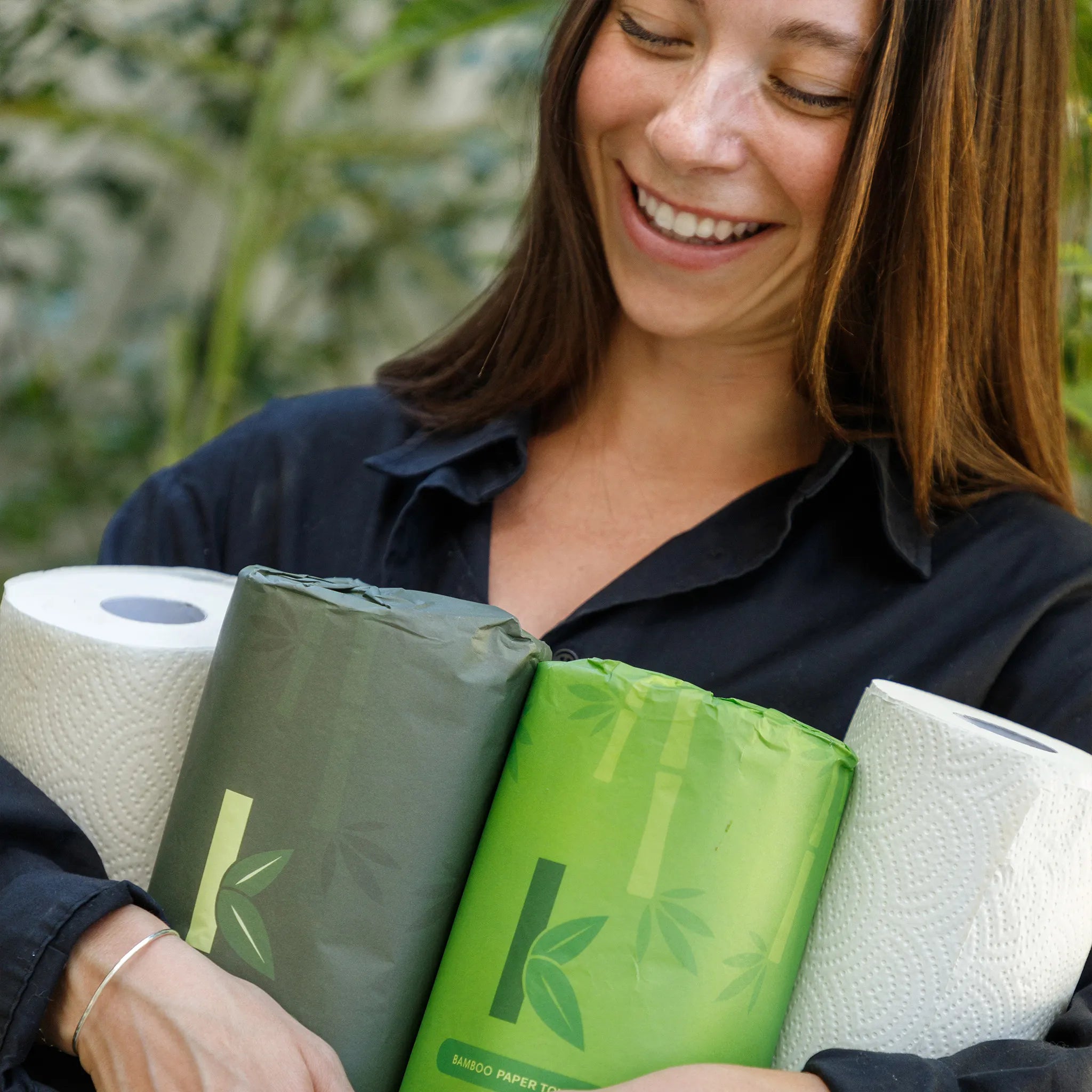
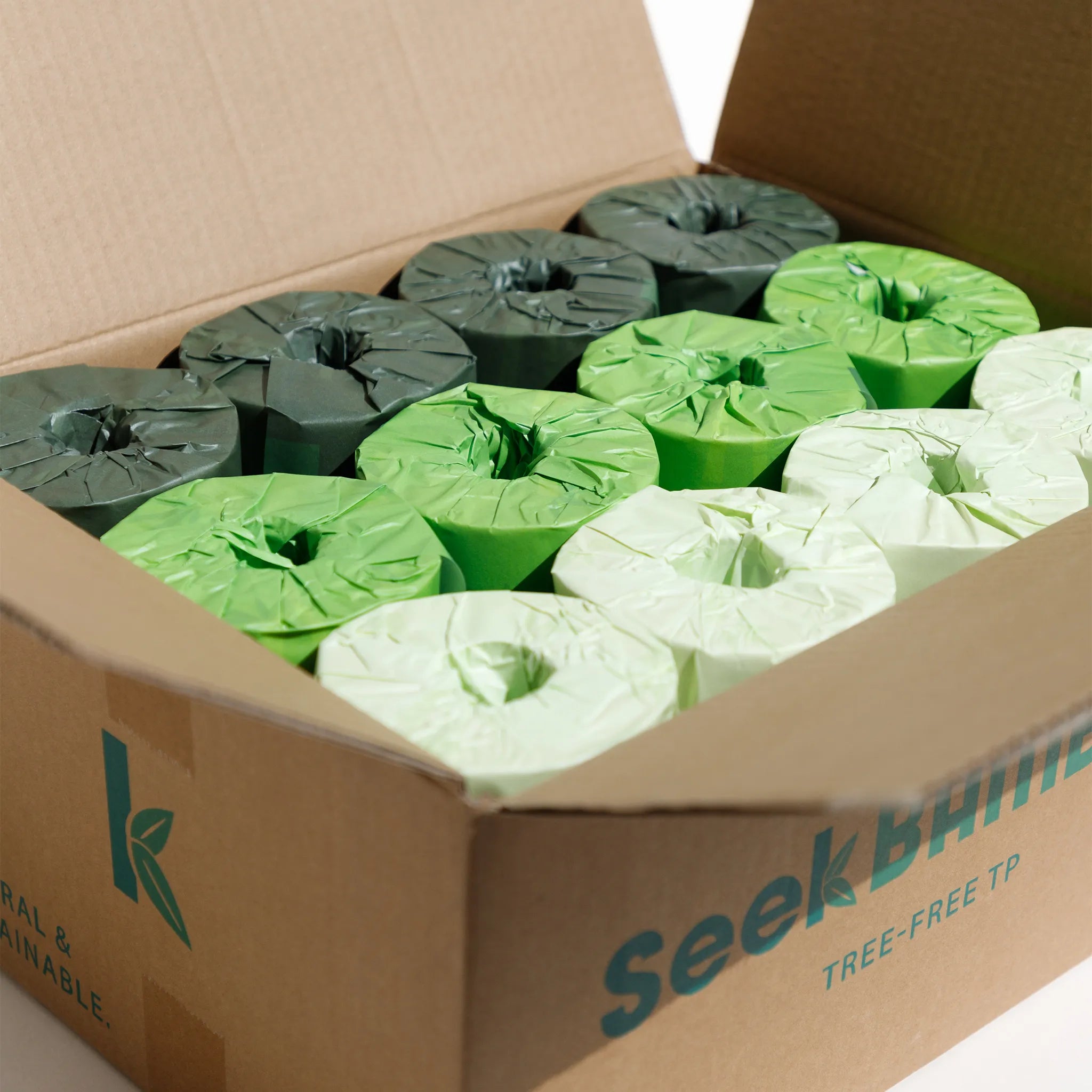


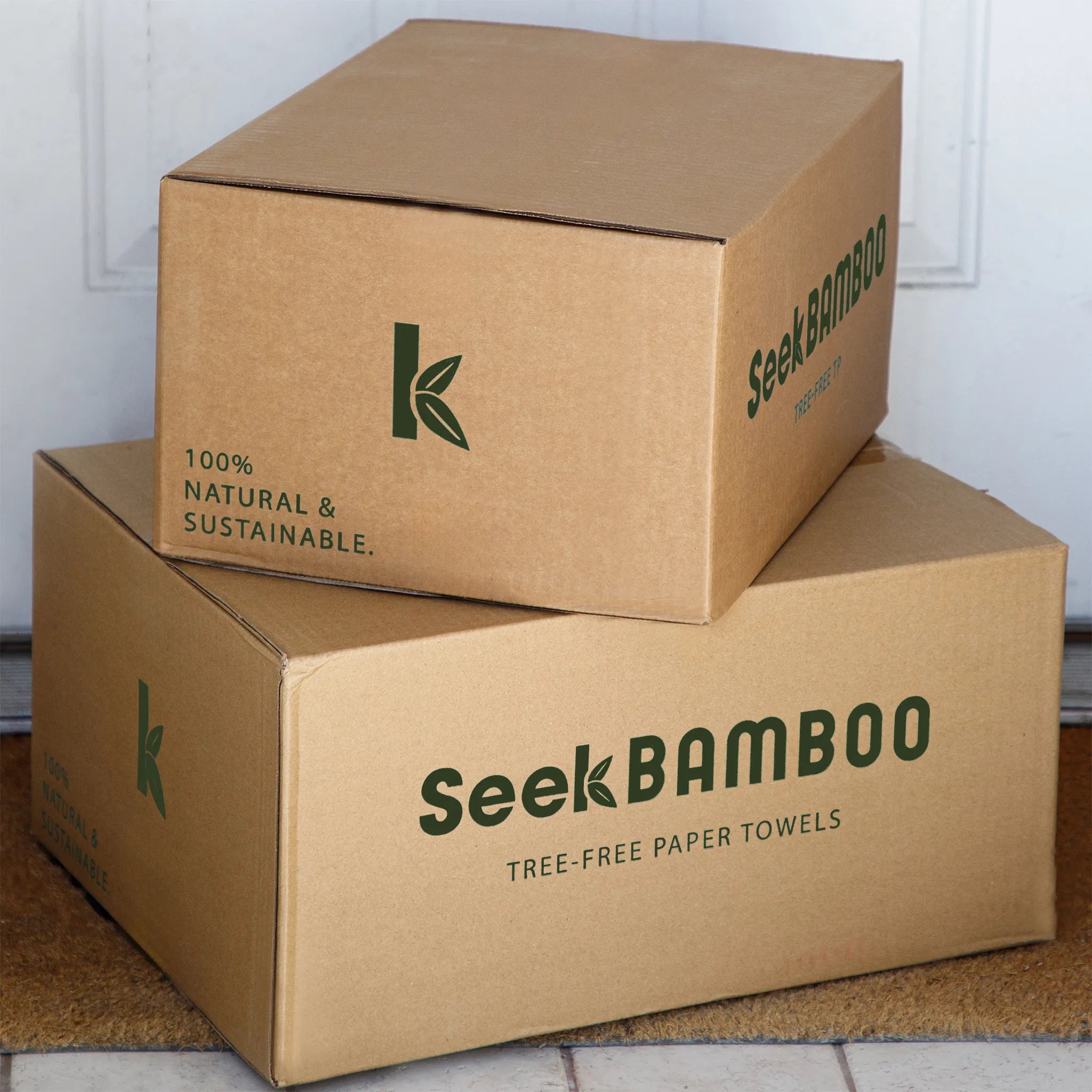
Description
✓ Free of BPA, PFAS, chlorine, dyes, & fragrances
✓ 24 TP rolls (300 sheets each) & 12 paper towel rolls (135 sheets each)
✓ Naturally antibacterial, hypo-allergenic, & safe for sensitive skin
✓ Plastic-free packaging: recyclable & compostable
Why Switch To Bamboo Toilet Paper?
In a world where the choices we make can have lasting impacts on our health and the environment, switching to bamboo toilet paper is a simple yet powerful step in the right direction. But beyond the obvious environmental benefits, there are several compelling reasons to make bamboo toilet paper your go-to choice.
Health Benefits
One of the most compelling reasons to choose bamboo toilet paper is its health benefits. Traditional toilet paper often undergoes bleaching processes that involve chlorine and other harsh chemicals. These chemicals can leave behind harmful residues, including dioxins, which are known to pose health risks over time. Bamboo toilet paper, however, is typically processed using eco-friendly methods that avoid these toxic substances, making it a safer option for your skin and overall health.
Bamboo’s natural properties also make it hypoallergenic, meaning it’s less likely to cause irritation or allergic reactions. This is especially important for those with sensitive skin, allergies, or conditions like eczema. You can be allergic to toilet paper.
With bamboo toilet paper, you can be confident that you’re using a product that is gentle enough for everyone in the family, from babies to adults.
Tree-Free Toilet Paper
Choosing bamboo toilet paper is not just a personal health decision; it’s an environmental one as well. Traditional toilet paper production is a major driver of deforestation, with millions of trees cut down each year to meet global demand. This large-scale deforestation contributes to habitat loss, increased carbon emissions, and the degradation of our planet’s forests.
Bamboo, on the other hand, offers a sustainable tree-free alternative. Bamboo is one of the fastest-growing plants on Earth, capable of reaching maturity in just a few years. It regenerates naturally without the need for replanting, making it an incredibly renewable resource. By switching to bamboo toilet paper, you’re helping to reduce the demand for tree-based paper products, thereby playing a part in preserving our forests and the countless species that rely on them.
3-Ply Bamboo Comfort
While bamboo toilet paper is an eco-friendly choice, it doesn’t compromise on comfort. Many bamboo toilet papers are available in 3-ply varieties, which offer a luxurious experience with every use. The 3-ply construction means the toilet paper is thicker, softer, and stronger, providing the perfect balance between comfort and durability.
This extra layer of softness ensures that bamboo toilet paper is gentle on your skin, while its strength means it won’t tear easily, offering the reliability you need. With bamboo toilet paper, you can enjoy the same, if not better, quality as your usual brand, all while making a more sustainable choice.
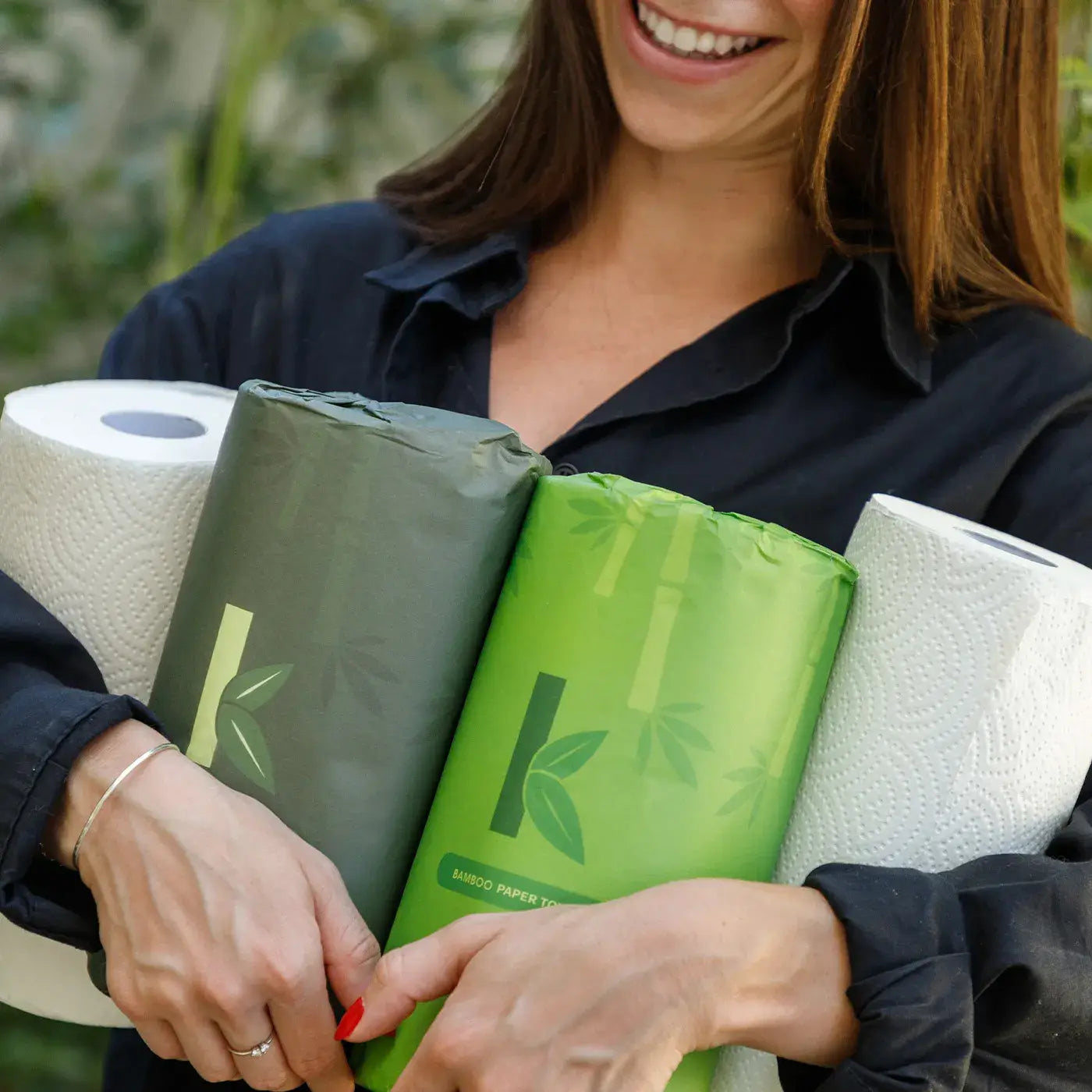
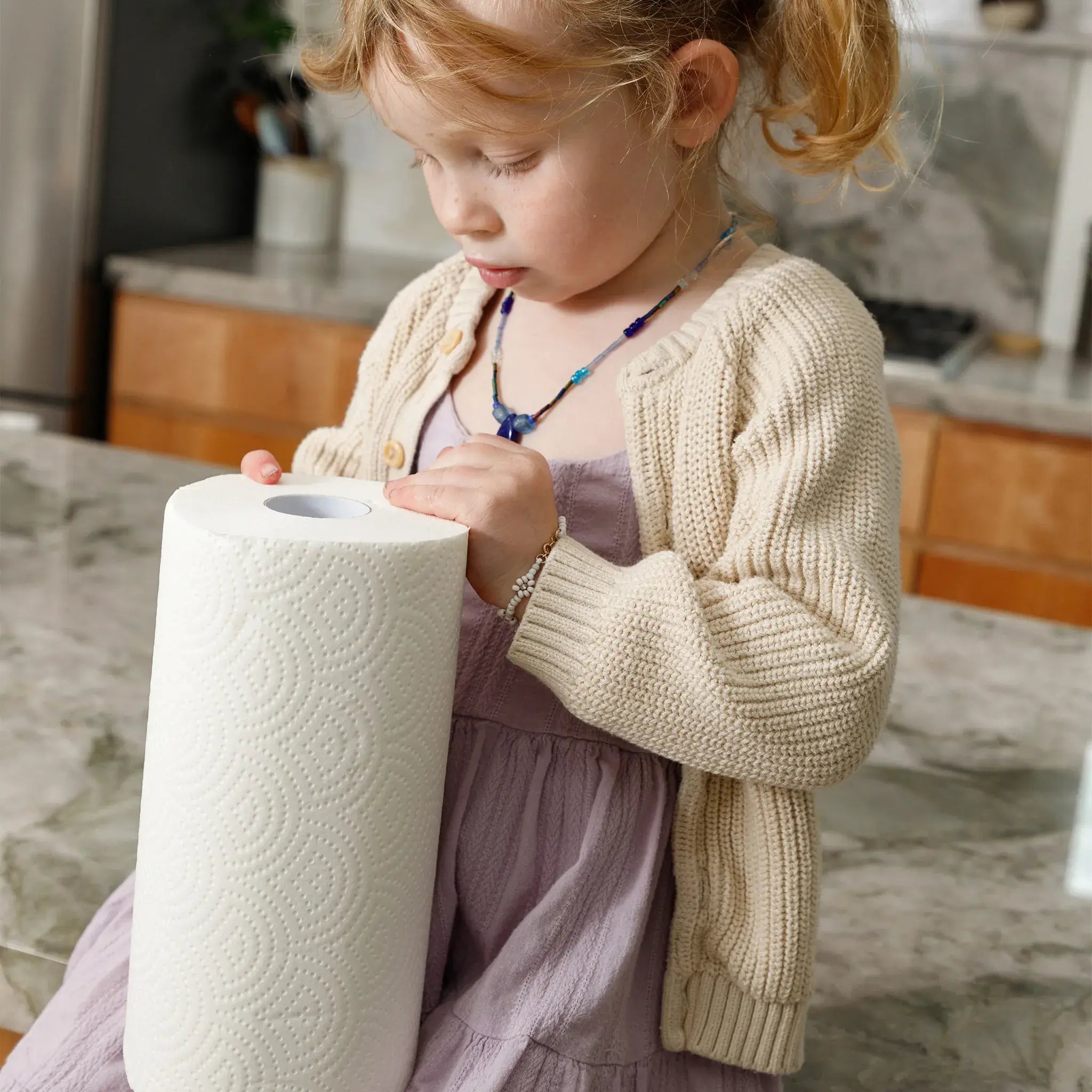

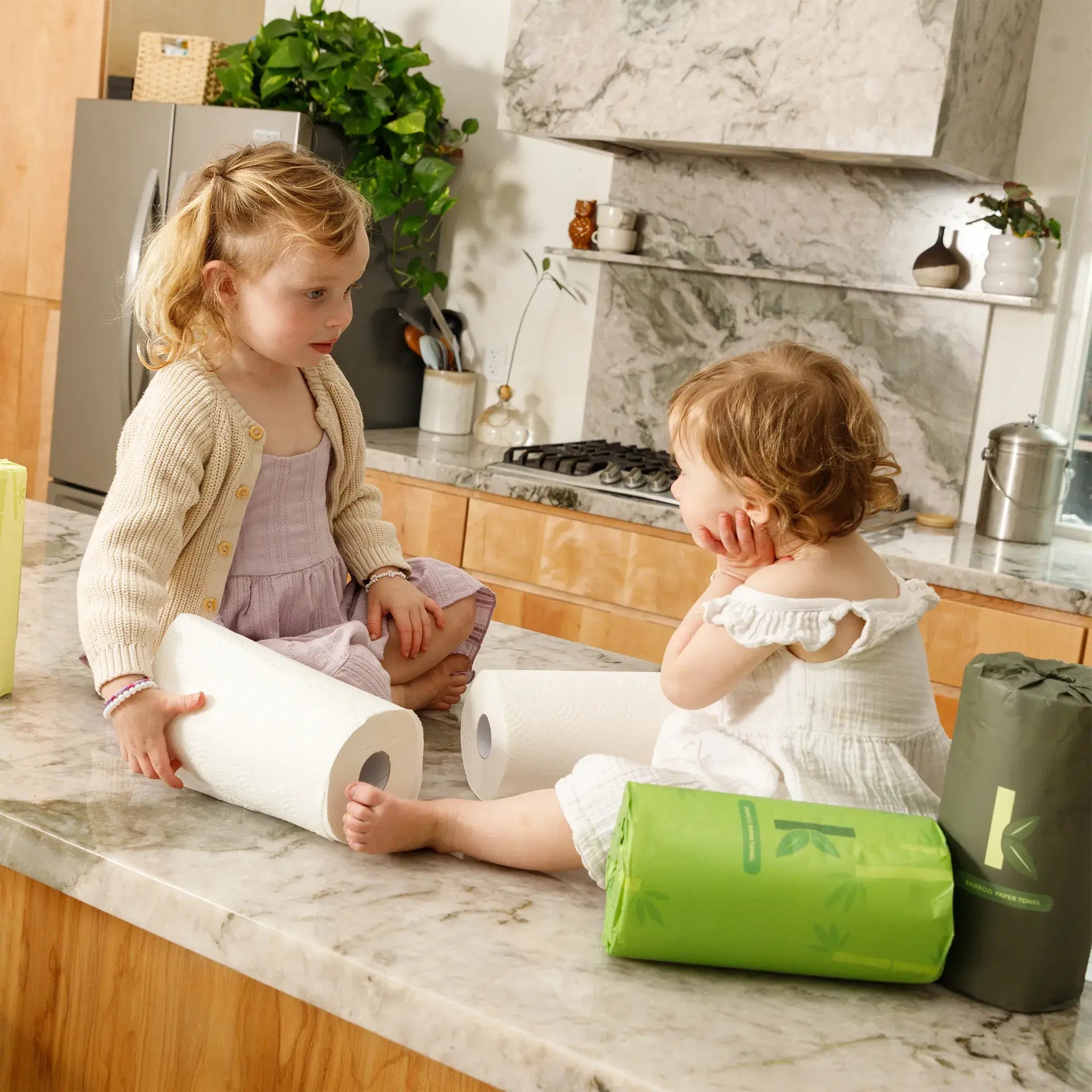

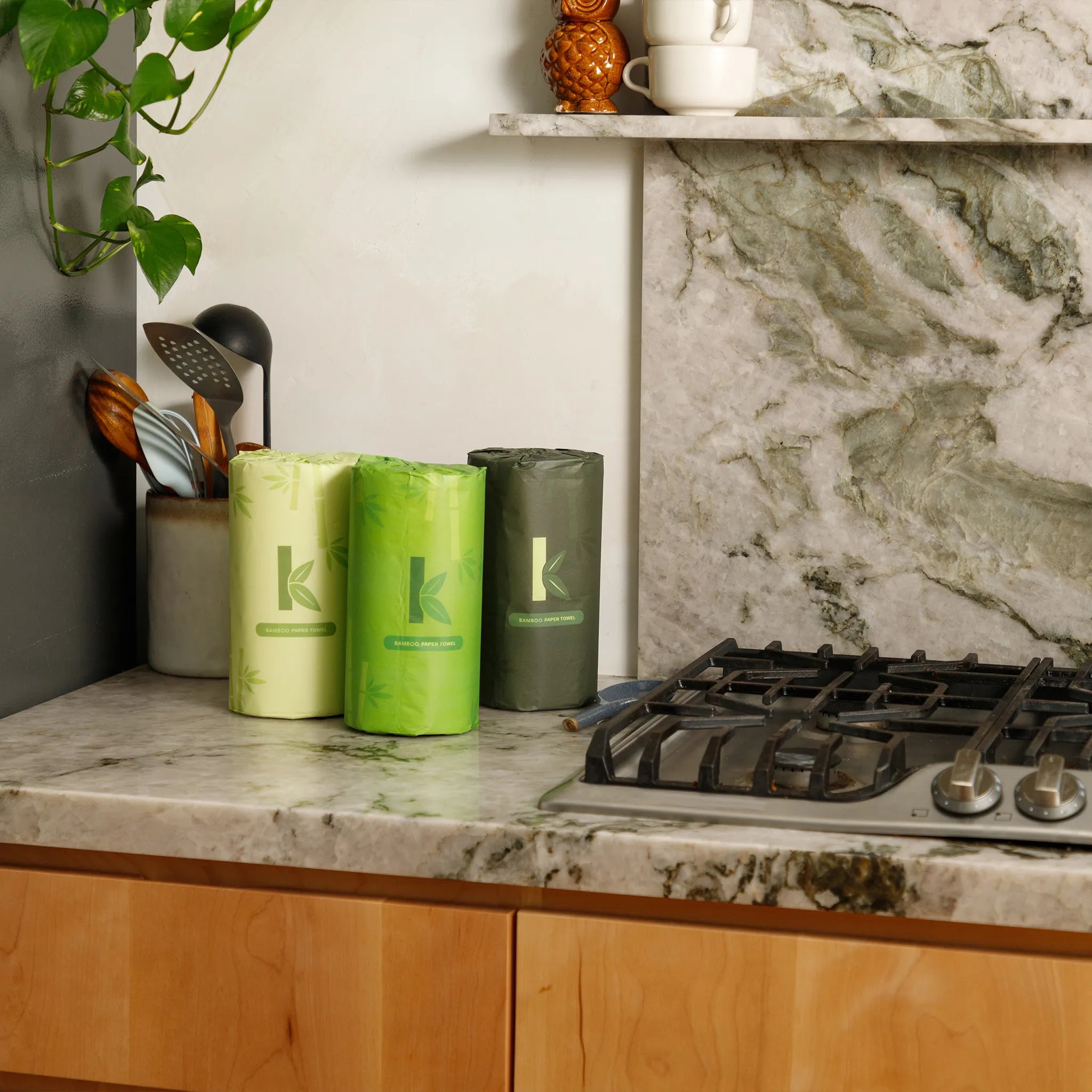

Elevate your cleaning routine with our bamboo paper towels, a step beyond the ordinary with enhanced softness and durability. Every sheet helps save trees and brings a smile, turning spills into an opportunity for sustainability. Switch to Seek Bamboo and let's roll into a greener future together – one soft, strong, eco-loving wipe at a time!
✓ Free of BPA, inks, dyes, & fragrances
✓ Sheet Count: 135 per roll for lasting use
✓ Whitening: Safe, Elemental Chlorine-Free
✓ Packaging: plastic-free, recyclable, compostable.
All About Toilet Paper From Bamboo
FAQ About Bamboo Toilet Paper
What is bamboo toilet paper, and how is it made?
Bamboo toilet paper is an eco-friendly alternative to traditional toilet paper made from bamboo fibers instead of tree pulp. Bamboo is harvested, and the stalks are processed into a pulp, which is then turned into soft, strong toilet paper. The production process typically involves fewer chemicals and less water than conventional paper production, making it a greener choice.
Is bamboo toilet paper really better for the environment?
Yes, bamboo toilet paper is generally better for the environment. Bamboo grows much faster than trees, reaching maturity in just a few years, which makes it a highly renewable resource. It also requires less water, no pesticides, and minimal land space to grow. Additionally, bamboo toilet paper production often results in fewer carbon emissions and less deforestation, contributing to a lower environmental footprint.
Is bamboo toilet paper as soft and strong as traditional toilet paper?
Bamboo toilet paper is known for being both soft and strong. Bamboo fibers are naturally smooth, resulting in a plush texture that is gentle on the skin. At the same time, bamboo is a highly durable material, making the toilet paper less likely to tear. Many bamboo toilet papers are also available in 3-ply versions, providing extra thickness and comfort without sacrificing strength.
Is bamboo toilet paper safe for sensitive skin?
Yes, bamboo toilet paper is generally safe for sensitive skin. It is often hypoallergenic and free from harsh chemicals like chlorine bleach, dyes, and fragrances, which are common irritants in conventional toilet paper. Bamboo’s natural hypoallergenic properties make it an excellent choice for those with allergies, eczema, or other skin sensitivities.
Can bamboo toilet paper be used in septic systems?
Bamboo toilet paper is typically safe for septic systems. It is biodegradable and breaks down more easily than some traditional toilet papers, making it less likely to clog pipes or cause issues in septic tanks. However, as with any toilet paper, it’s recommended to use it in moderation to avoid overloading your septic system.
How does the cost of bamboo toilet paper compare to regular toilet paper?
Bamboo toilet paper is generally more expensive than conventional toilet paper, primarily due to the sustainable practices and materials involved in its production. However, many consumers find that the environmental and health benefits justify the slightly higher cost. Over time, as demand for sustainable products increases, prices may become more competitive with traditional options.
Is bamboo toilet paper compostable?
Yes, bamboo toilet paper is compostable under the right conditions. It can be added to a compost pile, where it will break down along with other organic materials. However, it’s important to note that only unbleached, chemical-free bamboo toilet paper should be composted to avoid introducing toxins into your compost.
Does bamboo toilet paper have any impact on deforestation?
Using bamboo toilet paper helps reduce the demand for traditional tree-based paper products, which are a major cause of deforestation. Since bamboo grows rapidly and can be harvested sustainably without replanting, it provides a renewable alternative that can alleviate pressure on forests and contribute to the preservation of natural habitats.
Are there any chemicals used in the production of bamboo toilet paper?
The production of bamboo toilet paper typically involves fewer chemicals than traditional toilet paper. Most bamboo toilet papers are made without chlorine bleach, and some are processed using oxygen or hydrogen peroxide, which are less harmful to the environment. Always check the packaging for details on the production process and certifications to ensure you’re choosing a chemical-free option.
How does bamboo toilet paper compare to recycled toilet paper?
Both bamboo and recycled toilet paper are environmentally friendly options, but they have different benefits. Bamboo toilet paper is made from a fast-growing, renewable resource and is typically softer and stronger than recycled toilet paper. Recycled toilet paper, on the other hand, reduces waste by reusing paper materials but may not be as soft or durable. The choice between the two depends on your personal preferences and priorities.


